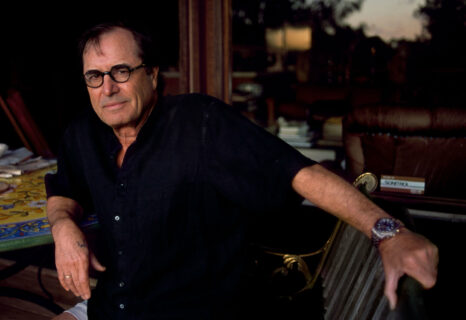P
aul Theroux is the author of many highly acclaimed books. His novels include The Lower River, Jungle Lovers, Hotel Honolulu
and The Mosquito Coast,
and his renowned travel books include Ghost Train to the Eastern Star
and Dark Star Safari.
He lives in Hawaii and on Cape Cod. The interview took place via email as the peripatetic author always seems to be on the go. As one of the most imaginative and influential travel and fiction authors writing today, he provides great insight into the art and craft behind his work.
What was the inspiration for The Bad Angel Brothers?
PT: I'm fascinated by two aspects of family life—one is sibling rivalry; the other is the way people develop in a positive way by leaving home—the Jungian process called individuation. I wrote extensively about a rivalrous family in
Mother Land, but I never really addressed the theme of two brothers, one of whom leaves the family to see the wider world as a geologist, his brother a lawyer remaining in the hometown. The novel's point is the return of the traveling brother, much changed, to the hometown and his litigious brother.
Where does it fit with your other novels like The Mosquito Coast, Hotel Honolulu or The Lower River?
PT: In my mind, all my work is connected—fiction and nonfiction—because it all comes out of my personal experience, and reflects my life at any given time. Everything I've written can be construed as elaborately autobiographical, even my long ago novel [which won the Whitbread Prize in England],
Picture Palace, narrated by an elderly woman photographer.
Why do you choose to write novels as opposed to nonfiction accounts like Dark Star Safari?
PT: I began writing, determined to be a novelist. Stuck for a fictional idea in 1973, I took a very long trip that became
The Great Railway Bazaar, and it was a success. Later I took trips for books when I got sick of sitting at my desk.
Why do you find travel writing appealing?
PT: Travel writing forces the traveler to observe details of people and landscapes and to draw conclusions, and it becomes a historical record of a particular place and time. It is seldom great literature but it has value as history, personal history as well as the portrait of a place or places.
Why is it challenging?
PT: In 1973 there was no internet, telephones were scarce or nonexistent, and most of the trains I took were choo choo trains, steam locomotives. I had no credit card. Nowadays, the challenges arise more from hostility toward older vulnerable-seeming strangers such as myself.
What do you find exhilarating about hitting the road?
PT: Being alone, being on the move, headed into the unknown or little known, and ideally, I am in a car, driving myself, with no definite date of returning home, winging it, as it were.
How do you take notes while you’re traveling?
PT: At the end of every day, I sit down, often as I'm having a solitary meal, and I recount the experiences of the day in a large journal. I make notes during the day in a small notebook. No computer. I have always written the first drafts of all my books in longhand.
What material do you record?
PT: Everything I've seen and heard in the greatest possible detail.
Do you set up interviews in advance?
PT: Now and then. I did so in much of
Deep South and some of my Mexico book,
On the Plain of Snakes. But I also depend on chance encounters.
How much of your itinerary is planned?
PT: Very little. I wander like a dog.
Do you have an idea of the shape of the story prior to the trip?
PT: No. I gather material and at the end, I try to find a pattern, "the figure in the carpet," James called it. But I also have themes in mind that suggest themselves en route—poverty in the South, the futility of aid in Africa, the heavy hand of the government in my China book,
Riding the Iron Rooster, and so forth.
When do you write the account? During or after the trip?
PT: I make extensive notes, a sort of narrative, and this becomes the book.
Has the world become a less mysterious place with all the GPS, cell phones, etc.? How has traveling changed?
PT: Travel has changed utterly, but to people who say it has become tamer and more easily Googled, I would say: once upon a time, I traveled alone through Afghanistan, and later through Syria and the Sudan, and the Soviet Union and into the Congo and down the Yangtze River. All of these places have changed, or no longer exist, or are war zones.
How have your travels changed over the years?
PT: Not much. I still go alone, I still try to avoid tourists, I am still intent on making discoveries.
Why do you keep traveling? Writing? What drives you?
PT: Writing to me is a process of life, and so is travel. I don't know of any writer or traveler I admire who retired from these efforts.
Where would you like to visit? What vistas beckon?
PT: I'd like to drive around Canada, land of my 17th-century ancestors. And also, exactly sixty years ago, I was a school teacher in Nyasaland. That became Malawi a year later, 1964. I'd love to go back and maybe teach for a while and write about it, the changes, the miseries and splendors. I still speak the national language, Chichewa, fairly well.

